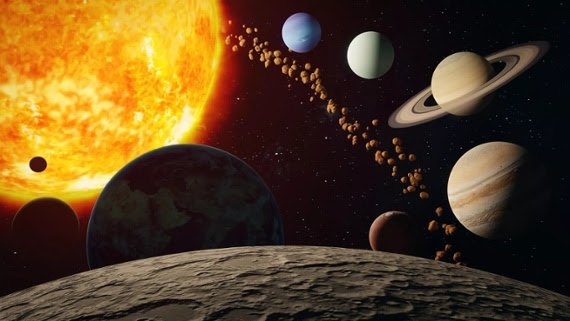3.136 AMICOR (25) próximo dia 17 estaremos completando 26 anos na WEB!
#Dra. Valderês Antonietta Robinson Achutti (*13/06/1931+15/06/2021)
#Science Magazine
Like treasured recipes that are passed down from generation to generation, there are only certain regions of DNA that evolution dares not alter. Mammals around the world share a variety of these coding sequences, for example, which have remained intact for millions of years.
Humans are a rare exception to this club. For whatever reason, the recipes long held by our ancient ancestors were suddenly “spiced up” in a short period of evolution. Because we are the only species in which these regions have been rewritten so quickly, they are called ‘human accelerated regions’ (or HARs). Furthermore, scientists believe that at least some of the HAR may be the source of many qualities that distinguish humans from their close relatives, such as chimpanzees and bonobos./.../
SOLAR SYSTEM

 |
BlenderTimer / Pixabay |
|
|
#NAUTILUS
Our Most Read Stories from Each Year |
This week marks 10 years since Nautilus first started publishing. Let’s have a look back at the most-read articles from each of our first 10 years. |
#Medscape
| May 11, 2023 | ||
| Cães detectam covid-19 em crianças e adolescentes assintomáticos | ||
| Hipoglicemia, câncer, malária, convulsões iminentes, migrânea e agora... covid-19. Pesquisa preliminar mostra que cães farejadores podem identificar pacientes assintomáticos infectados por SARS-CoV-2. | ||
|
Human pangenome supports analysis of complex genomic regions
QUOTE OF THE DAY
“Humans live in a culture in which it seems as if everything must go right the first time we try it, but that is not how successful products are developed, nor how science unfolds.”Recent space-exploration hiccups — such as the loss of an international Moon mission and the untimely end of the SpaceX Starship rocket test — show that failures are painful but essential part of the work, argues a Nature editorial. (4 min read)
Gut microbes likely contribute to the development of anorexia Your gut hosts a massive population of more than 1,000 bacterial species, which outnumber the cells in your body by a factor of ten, and they contain at least 100 times more genesthan are encoded by your own DNA. It is also home to many thousands of viral species, aswell as archaea and fungi.These microbes, collectively referred to as the gut microbiome, begin to colonize the gastrointestinal tract at birth. Research published over the last 20 years has implicated gut bacteria in numerous processes, ranging from brain development and immune system function to digestion and drug metabolism. As well as playing vital roles in maintaining health, gut bacteria are also linked to a wide variety of chronic diseases, including asthma, diabetes, irritable bowel disease, and rheumatoid arthritis, as well as mental health disorders such as anxiety and depression. Research published in the journal Nature Microbiology now suggests that gut microbes contribute to anorexia nervosa./.../ |
#Resgate de artigos antigos meus já publicados na imprensa...
De Médicos e Medicina (data?)
Aloyzio Achutti. Médico.
É curioso e intrigante observar o crescente prestígio e valorização da
Medicina, enquanto médicos e pacientes estejam cada vez mais insatisfeitos com
a prática. As ciências biomédicas (não confundir com medicina) têm se
desenvolvido vertiginosamente na esteira das conquistas científicas e
tecnológicas permitindo a realização de diagnósticos e tratamentos até há bem
pouco inimagináveis. Estes recursos tornam-se cada vez mais caros por serem
tratados como produtos de mercado, e envolverem custos marginais relacionados
com inúmeros interessados da indústria farmacêutica, de equipamentos,
organizações hospitalares, de pesquisa, securitárias, de especulação
financeira, político-governamentais e de outras profissões que atuam no mesmo
setor. Além de lidar com a vida humana (cujo valor é inestimável), a operação
deste oneroso e complexo sistema depende ainda em grande parte do médico,
sobrando-lhe cada vez menos para remunerar seu trabalho e comprometendo-lhe a autonomia.
É bem possível que a crise seja bem mais ampla e relacionável com a
problemática observável em outros setores, quando se diz serem necessárias
reformas econômica, política e ética para readequar a estrutura de nossa
sociedade, por não mais corresponder ao grau e tipo de desenvolvimento e
globalização.
Além da impossibilidade de conciliar totalmente os interesses do
paciente, da ciência e do profissional, é preciso enfrentar o dilema da
qualidade e da extensão de cobertura. As soluções adotadas, mesmo com o suporte
de recursos tecnológicos, não têm o dom de multiplicar o número de
profissionais capacitados, preservar a continuidade e estender o tempo
necessários para estabelecer uma adequada relação médico-paciente, e ao mesmo
tempo promover o atendimento em massa.
Em condições muito menos complexas, com uma demanda certamente bem
mais reduzida e exigente, Platão já reconhecera o dilema, e estabelecera duas
categorias de profissionais: os médicos
de escravos e os de homens livres. Os primeiros corriam de um paciente a outro
sem maiores preocupações (expressão usada por ele), enquanto que os de homens
livres esperavam convencer o paciente antes de proceder a cura.
A abrangência atual e diversidade dos objetivos profissionais têm
ofuscado o foco primordial e humanístico, dificultando o relacionamento,
complicando a formação, e distraindo a atenção das causas das causas das
doenças. Ao mesmo tempo nosso modelo cultural centrado no pragmatismo
mercadológico e competitividade agressiva, tem corroído muito do idealismo de
uma profissão inicialmente confundida com o sacerdócio...
Bem, quando descobrimos que até os sacerdotes não são mais os mesmos,
quem sabe não é chegado o tempo de reservar o título de médico somente para
aqueles que se conformem com a prática da medicina centrada na pessoa humana, integrada em seu contexto histórico e social?
#
| ||||||||||||||||||
| ||||||||||||||||||
|















No comments:
Post a Comment